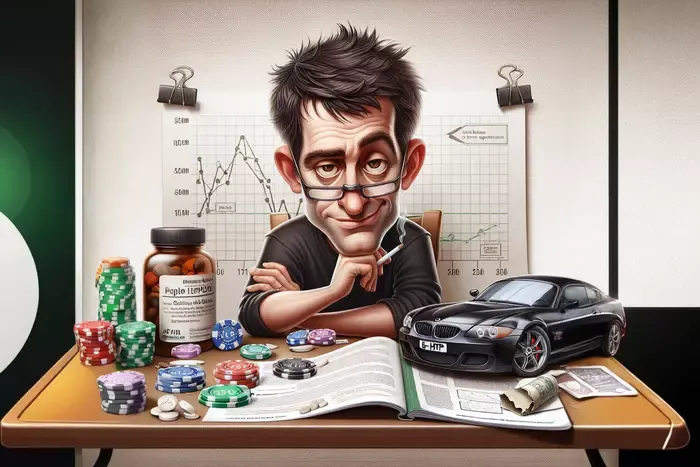Life has a preset condition that none of us can avoid.
Despite what Disney Movies told us through our childhood, things go wrong sometimes. We don't always see it coming and we don't always prepare for it. Even when we see the bad times coming, a blind eye might preserve our mood. We all choose to fight our emotional battles with different tools.
We asked members of our forum about loss and downswings in life, not necessarily on the felt. This isn't to depress you. Maybe, there are takeaways for all of us in our peer's stories. It would be a better world if we never needed this advice, if we never needed to face tremendous losses, but we do not live in a fairy tale.
Ilya Gorodetsky ilushan // t.me/Assorted oGorod
I must candidly acknowledge that I'm in a far better position than many people on Earth when it comes to handling stress. I have a very stable nervous system, and to borrow a phrase from Hermione Granger about Ron Weasley, my "emotional range is more or less that of a teaspoon." I'm amused, of course, that Ron's limited emotional spectrum didn't stop a delightful girl from falling for him. And let's be honest, there's a bit of vanity in this admission—we all face tough times and moments of near despair.
My primary piece of advice is not to try to weather life's storms and pain on your own. In the brilliant TV series "Ted Lasso," there's a poignant line:
“I promise you, there is something worse out there than being sad and that is being alone and being sad”.
Everyone needs a support network, a group of people close to them. What you do with these cherished individuals—whether it's sitting in silence, processing events, offering comfort, sharing a beer, or frying potatoes—becomes secondary to the fact that you're together.
I don't claim my advice to be one-size-fits-all. For some, solitude might be beneficial, but personally, I don't find it helpful.
Another strategy I rely on is establishing structure and routine. I navigated through the toughest time in my life by adhering to a consistent pattern of actions, even if they felt mechanical at times. Gaining some semblance of normalcy, stability, or predictability can be comforting. While it might not appeal to everyone, I recently watched a film called “Perfect Days,” which touches on this theme. Ironically, it was on my way to the cinema to see this movie that I learned about a tragedy, prompting the creation of this article.
Lastly, and I say this as someone who is not a psychologist, it's crucial to allow oneself to feel pain and find a way to express it. Suppressing negative emotions is, in my view, the worst approach. Unexpressed, these feelings will inevitably start to erode your well-being from within. The method of releasing these emotions isn't as important as ensuring you don't bottle up feelings of sadness and despair.
 Jersey FC "Richmond" from the series "Ted Lasso", which was sent to Ilya by a forum member, specially ordering it in China
Jersey FC "Richmond" from the series "Ted Lasso", which was sent to Ilya by a forum member, specially ordering it in Chinakoscience // safespace PhD
Life throws challenges at us in various forms, necessitating different coping mechanisms. However, I've found that the sun and fresh air invariably provide some relief.
When it comes to poker-related stress, taking a break and engaging in constructive activities works wonders for me. I use this time to review the correlations between HUD statistics and hand ranges, or to update the database for my weekly reports.

During those bleak February moments when it feels like nothing can make things better, I find solace in listening to Ekaterina Schulmann and chatting with friends. In times of anxiety, the presence of loved ones is crucial for me to manage.
When faced with a deep, sorrowful kind of "bad," I brace myself for the outcome. To distract myself, I watch episodes of "Friends" or "The Big Bang Theory," hit the gym, or simply lie on the couch. To keep functioning, I engage in small, everyday tasks. Changing a diaper, doing the dishes, reading bedtime stories to my children, taking family walks, and ensuring I go to bed on time help the day pass. And with each new sunrise, life moves forward.
Ivan Av1rex // t.me/ChevereYoss
God is merciful and such that “everything is very bad” did not happen in my life. The maximum was “just bad” (that's about 4 out of 10 on the badness scale).
Well, first of all, it’s worth looking at the whole picture and realizing what’s happening. Secondly, don’t make things worse. Stop, just relax and calm down, don’t make any mistakes. And then we need to figure out what to accept and what to change, and if we change, then how. And after that, start taking action.
But this is all in theory, in practice it usually turns out very differently.
Diesel // Tinder. Wut?
Poker has taught me to maintain my composure; I rarely tilt or become angry. Of course, I feel disappointed when a significant pot doesn't go my way, if I'm beaten by a runner-runner in the late stages of a tournament, or if I deplete my balance due to playing without strict bankroll management (BRM). I might occasionally let out a strong word or slam my palm on the table, but more often than not, my reaction is along the lines of "Oh well, it happens."
During particularly tough times, what has consistently helped me is the understanding that all bad things will eventually pass. This aligns with the Buddhist concept of "anicca/anitya," which I encountered and found to resonate deeply with my worldview. It teaches that nothing in this world is permanent, neither the good nor the bad. This perspective reminds me that there are no situations so dire they can't change or problems so big they can't be solved—or at least, they won't seem as significant in time. Therefore, it's pointless to dwell in suffering.
If I find myself fixated on something distressing, keeping busy and distracted is a reliable solution. This could be through work, playing computer games, reading books or watching movies, or even doing some cleaning. Engaging in activities that require focus or occupy my mind always helps.

In life's most challenging moments, I've sought comfort and conversation with my family—my parents and brother. However, for the past decade, all my relatives have been living far away. The toughest times are behind me, times when I felt more emotionally vulnerable. Talking about my problems with someone, whether constructively or not, is beneficial, though I seldom seize this opportunity. I generally dislike constant complainers, so I strive not to be one myself. Nonetheless, the value of friendly support cannot be overstated.
For an immediate mood boost, I find it helpful to step away from the computer (where I spend most of my time), put on Radio Rocks through my headphones, and take a leisurely walk through the city. I prefer wandering the wide streets without a destination in mind. Overall, I have a greater affinity for urban environments than natural settings.
Andrew DelProc // And Jacob wrestled with the Angel, and he was left lame.
Asking this question hits close to home for me; I consider myself deeply knowledgeable on the subject. My experiences with poker and casino trials have led me through intense periods of distress and suffering. It wasn't just a matter of feeling sad; I was burdened with a profound sense of anguish that weighed heavily on my heart and soul. The guilt was consuming, and I felt ashamed in front of my loved ones, even though they were unaware of my struggles. This probably mirrors the feelings experienced by individuals battling early stages of alcoholism or drug addiction. However, eventually, my sense of shame began to fade.
I had a moment of clarity and told myself, "Andrey, you're not cut out for high-level poker. You're not going to be the next Fedor Holz or Daniel Negreanu." It was at this point I believe I reached a stage of acceptance and humility. I realized that there are countless ways to find joy outside of poker.
Here's what helped me turn things around:
- Shifting Gears: I decided to step back from professional poker and keep it as a hobby. The world is vast and full of opportunities to explore. I also began keeping a journal, specifically for poker-related thoughts.
- Finding New Passions: I made an effort to engage in different activities. I've always enjoyed long walks and fresh air, especially in good company.
- Digital Detox: I chose to limit my computer use and stay away from environments that reminded me of past failures.
- Embracing Sports: Basketball became an outlet for me, and I also joined a quiz team. We've had great success and fun in our gatherings.
- Diving into Books: Whether it's a mystery, fantasy, or adventure novel, reading has been a great escape.
- Spending Time with Pets: My dog and cat have been incredible sources of comfort. Walking my Alabai and spending time with my cat have been therapeutic.

- Indulging Occasionally: Enjoying a cup of coffee or a treat helps, though I'm cautious not to fall into stress eating.
- Self-Deprecating Humor: I've found that laughing at myself and embracing self-irony can be incredibly freeing.
- Home Entertainment: An evening spent playing the guitar or engaging in board games like Crocodile, Carcassonne, and Jumanji brings a lot of joy.
I strongly advise against using alcohol to cope with stress. It's not a solution, not even in the slightest.
MaDzzz // MaD Blog, SH Reg-Zoom: Rise of the Machines
I always make sure to follow bankroll management principles, set stop-loss limits, reduce the number of tables I play at, watch more educational content, and move down to lower limits to rebuild my confidence in my game.
When facing a losing streak, it's wise to take a break for a few days, especially after a series of negative sessions. I've personally gone through this multiple times. Seeking advice from the community can also be beneficial; usually, someone will offer a practical suggestion when you're facing a tough spot.

Regarding life's challenges, I recently experienced one myself when a car from the oncoming lane crashed into mine. Fortunately, I managed to swerve slightly, so the impact was on the left side of my car. I wasn't injured, but my car is now out of commission. Given the current difficulties in obtaining spare parts in the Russian Federation, I anticipate the repairs will take at least six months. This situation reminded me of the importance of applying poker strategies like bankroll management (BRM) to real-life scenarios, such as budgeting and not overspending, creating a mind map to explore possible solutions, and even consulting artificial intelligence for advice. The key is to continually set new goals and keep moving forward, regardless of the pace.
In stressful situations, I find it helpful to use supplements like 5-HTP, which boosts serotonin levels and has a calming effect.
Editor's note – It's important to consult with a healthcare provider before starting any new supplement.
Oleg lllllllllllll // t.me/Poker and psychology with Oleg Rivernuts
I chose to write about the loss of my parents because, against the backdrop of such a loss, conflicts with others and personal challenges seem minor and insignificant, making them much easier to endure.
In such circumstances, some people might enter a state of denial, attempting to maintain their usual way of life as if nothing has changed, while ignoring the turmoil within. Others may be consumed by guilt, regretting their inability to prevent the loss or unresolved conflicts and harsh words exchanged. Anger may surge in some, directed at the world, others, themselves, or even a departed parent. Some individuals might find themselves losing interest in life and the motivation to move forward, feeling as though everything has lost its meaning. Meanwhile, others may be overwhelmed by fear of what the future holds.

A significant mistake is to bottle up emotions with the belief that "men don’t cry," leading only to increased stress. This can eventually result in emotional issues such as profound sadness, a disinterest in everyday activities, lack of energy, concentration and appetite problems, insomnia, and feelings of guilt or helplessness.
It's crucial to express your emotions and allow yourself to cry over the loss. Crying is a means of releasing your feelings, processing them, and beginning to move past grief, pain, sadness, and other challenging emotions that emerge after a loss. Crying also triggers the release of endorphins, which can alleviate pain.
To start overcoming this state, you can begin by recalling and expressing gratitude to your mom or dad for the joyful moments you shared. Saying, "I am grateful to you for..." will naturally bring about a flood of emotions and tears.
Then, it's important to acknowledge that at any given moment, a person makes the best decision they can based on their current situation, considering their experiences, skills, thought habits, reflexes, and emotional state. Forgiving yourself for past mistakes is essential, recognizing that you did the best you could at the time, and if you had the capability to do better, you would have.
Talking to a loved one with whom you feel comfortable crying can also be beneficial. If you don't have such individuals around you, seeking help from a professional is advisable.
victorwinner
When things seem overwhelmingly negative, it's crucial not to become paralyzed or lost in your thoughts. Action is necessary. For instance, I've recently started to track my calories, paying close attention to the balance of proteins, fats, and carbohydrates.
I've shared on the forum before that in September 2022, I began consulting a psychiatrist. This move has been somewhat beneficial; I've started to cut back on alcohol, a habit I enjoyed for around 25 years. I'm also working on quitting smoking, a vice I've had for 16-17 years. Additionally, I've taken up weight training.
Next on my list is tackling my gambling addiction. This challenge is particularly tough for me since I'm still involved in the gaming world through sports betting, which keeps me connected to gaming sites. I'm hopeful, though, that I'll overcome this as well.
In essence, it's all about keeping active. Movement is synonymous with life. The key is to never stand still.
And finding motivation is important too. At nearly 43, I find motivation in women :-) They inspire me to improve myself. Focusing on physical fitness is one approach. But, I believe I'm already in a good place mentally :-)
Anya LittlePig // Zoom only, hardcore only!
In situations when something bad happens, I immediately go on tranquilizers) Well, I try not to neglect routine activities – yoga, reading, meditation and walking.
If I don’t have the moral strength to do anything at all, I try to do at least something, for example, meditate and read. This allows me not to feel like a complete vegetable) I’m also starting to play Dota more, because in the game I forget about the problems of real life and think only about finishing off creeps and killing heroes, how to farm items, and other in-game shenanigans.
